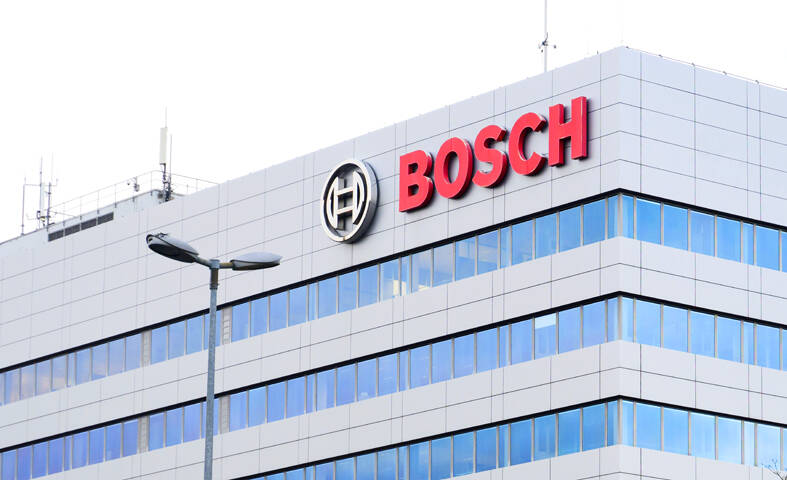Germany’s technology and services company Robert Bosch GmbH on Friday said that it planned to reduce its automotive division workforce by as many as 5,500 jobs in the next several years in another sign of the headwinds hitting the German and global auto industries.
The company cited stagnating global auto sales, too much factory capacity in the auto industry compared with sales prospects and a slower-than-expected transition to electric-powered, software-controlled vehicles.
The news comes two days after Ford Motor Co announced plans to cut 4,000 jobs in Europe, and with Volkswagen AG employees threatening work stoppages over what they say management has told them are plans to close as many as three factories in Germany. Meanwhile, revenue at Stellantis NV tumbled 27 percent in its most recent quarter that ended this fall.

Photo: Alicia Windzio / dpa via AP
Auto sales have slowed this year in Europe as consumers stung by inflation hold back on spending, while automakers have sunk billions into developing electric vehicles only to see slower sales than expected and new competition from cheaper Chinese brands. Moreover, the German government abruptly canceled purchase incentives at the end of last year, sending electric vehicle sales in that country down by 27 percent over the first nine months of this year.
About 3,500 of the job reductions at Bosch would come before the end of 2027 and would hit the part of the company that develops advanced driver assistance and automated driving technologies, as well as centralized vehicle software, the company said, adding that about half of those job reductions would be at locations in Germany.
“The auto industry has significant overcapacities,” the company said in a statement. “In addition, the market for future technologies is not developing as originally expected... At the moment, many projects in this business area are being put off or abandoned by automakers.”
In addition, 750 jobs would be lost at a plant in Hildesheim, Germany, by the end of 2032, 600 of those by the end of 2026. A plant in Schwaebisch Gmund would lose 1,300 jobs between 2027 and 2030.
The reductions are still in the planning stage and final numbers would have to be agreed with employee representatives and carried out in what the company said would be a socially responsible way.

Intel Corp chief executive officer Lip-Bu Tan (陳立武) is expected to meet with Taiwanese suppliers next month in conjunction with the opening of the Computex Taipei trade show, supply chain sources said on Monday. The visit, the first for Tan to Taiwan since assuming his new post last month, would be aimed at enhancing Intel’s ties with suppliers in Taiwan as he attempts to help turn around the struggling US chipmaker, the sources said. Tan is to hold a banquet to celebrate Intel’s 40-year presence in Taiwan before Computex opens on May 20 and invite dozens of Taiwanese suppliers to exchange views

Application-specific integrated circuit designer Faraday Technology Corp (智原) yesterday said that although revenue this quarter would decline 30 percent from last quarter, it retained its full-year forecast of revenue growth of 100 percent. The company attributed the quarterly drop to a slowdown in customers’ production of chips using Faraday’s advanced packaging technology. The company is still confident about its revenue growth this year, given its strong “design-win” — or the projects it won to help customers design their chips, Faraday president Steve Wang (王國雍) told an online earnings conference. “The design-win this year is better than we expected. We believe we will win

Chizuko Kimura has become the first female sushi chef in the world to win a Michelin star, fulfilling a promise she made to her dying husband to continue his legacy. The 54-year-old Japanese chef regained the Michelin star her late husband, Shunei Kimura, won three years ago for their Sushi Shunei restaurant in Paris. For Shunei Kimura, the star was a dream come true. However, the joy was short-lived. He died from cancer just three months later in June 2022. He was 65. The following year, the restaurant in the heart of Montmartre lost its star rating. Chizuko Kimura insisted that the new star is still down

While China’s leaders use their economic and political might to fight US President Donald Trump’s trade war “to the end,” its army of social media soldiers are embarking on a more humorous campaign online. Trump’s tariff blitz has seen Washington and Beijing impose eye-watering duties on imports from the other, fanning a standoff between the economic superpowers that has sparked global recession fears and sent markets into a tailspin. Trump says his policy is a response to years of being “ripped off” by other countries and aims to bring manufacturing to the US, forcing companies to employ US workers. However, China’s online warriors